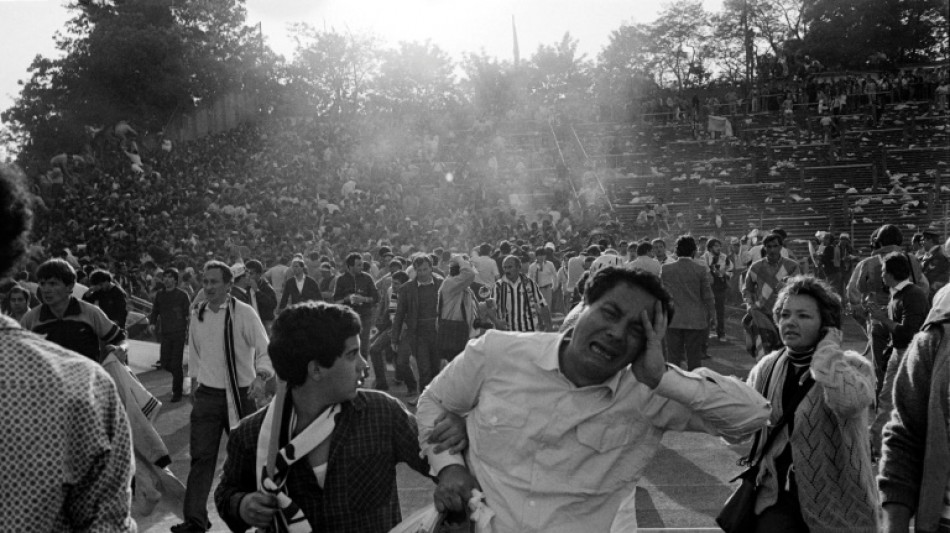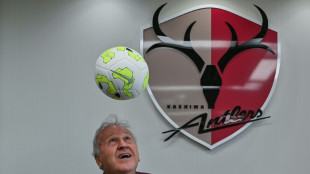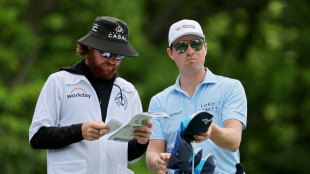

Former police chief 'scarred for life' 40 years after Heysel disaster
Forty years after the Heysel Stadium disaster, former police commissioner Roland Vanreusel remains traumatised "by the sight of the bodies and the cries of those who were dying".
Before the 1985 European Cup final between Juventus and Liverpool in Brussels, English fans clashed with their Italian counterparts inside the Heysel Stadium.
The crowd trouble culminated in a surge by Liverpool supporters towards the Juventus fans, leading to the collapse of a crumbling wall.
Thirty-nine people died, mainly Juventus supporters, with more than 500 others injured.
Vanreusel was 38 at the time, the Brussels deputy chief commissioner and in charge of overseeing major events.
"I am scarred for life," he told AFP ahead of Thursday's anniversary.
"What I remember most are the cries of pain from those people who were suffocating to death and the cries of joy from the supporters celebrating Juve's victory, unaware of the tragedy that had just unfolded."
Vanreusel recalled how he had visited Liverpool on a fact-finding mission a few weeks before the final.
"The English police had told me that the Reds' supporters were among the most well-behaved in England. At Anfield, there were no fences between the stands and the pitch.
"Unfortunately, several thousand English fans arrived in Brussels drunk. They took their places in a dilapidated stadium, with rough stands and loose bricks, separated from the Juve supporters only by basic fences."
At 7:20 pm, nearly an hour before the start of the match, the English fans in stands X and Y stormed stand Z, where hundreds of Italians were seated.
Hundreds of fans piled on top of each other, were crushed and suffocated.
Fourteen Liverpool fans were later found guilty of manslaughter and jailed, while police captain Johan Mahieu, who was in charge of security, and ex-Belgian football federation chief Albert Roosens were given suspended sentences.
"The stadium had been divided in two. One part was secured by my Brussels police teams, the other by the national gendarmerie.
"The gendarmes had no experience of football matches. It was the first time they had set foot in this outdated stadium, which should never have been able to accommodate 60,000 spectators.
"The gendarmerie commander, captain Mahieu... had stepped in at the last minute to replace the officer in charge, who had fallen ill two days before the match.
"He had placed just 10 unfortunate men between the supporters of the two sides, when at least a platoon of 30 men would have been needed, as I had done in the sector under my responsibility.
"Those poor gendarmes were swept away by the crowd."
- 'Put me off football for life' -
The disaster led to English clubs being banned from all European competitions for five seasons, with the suspension not lifted until the 1990/91 season. Liverpool were banned for an additional year.
"It was a nightmare! While a tragedy was unfolding, supporters were singing and shouting with joy on the other side of the stadium! The wounded and dead were piling up.
"In the midst of this chaos, I searched for my 15-year-old son, who was supposed to be in the ill-fated Z stand. I went looking for him, moving from corpse to corpse. You have to put yourself in the context of the time -- there were no mobile phones or internet.
"I was only reassured an hour later. Seeing the bodies lying at the entrance to the stadium, my son had turned back.
"I pulled myself together and advised my boss to let the match go ahead. We had to.
"How could we have held back 60,000 over-excited people? It would have been carnage. How many more deaths would there have been?"
Juventus won the match 1-0.
"I didn't see any of the match. Except for the penalty by Michel Platini that gave Juve victory," Vanreusel recalled.
"The Frenchman jumped for joy even though he knew there had been deaths. That put me off football for life."
The ban on English clubs ended a period of dominance that saw teams from England win seven of nine European Cups.
UEFA eventually tightened security at stadiums and implemented sweeping safety measures following the 1989 Hillsborough disaster in Sheffield, when 97 Liverpool fans were killed in a crush caused by failures by police and emergency services before an FA Cup semi-final against Nottingham Forest.
O.Soria--GBA



